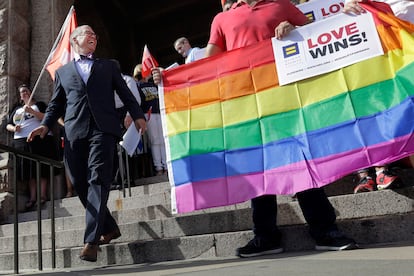LGBTQ+ Pride month kicks off with protests, parades and parties
This year’s Pride takes place in a contentious political climate where legislative action coming out of many statehouses has banned drag shows and access to gender-affirming care

The start of June marks the beginning of Pride month around the U.S. and some parts of the world, a season intended to celebrate the lives and experiences of LGBTQ+ communities and to protest against attacks on hard-won civil rights gains.
This year’s Pride takes place in a contentious political climate in which some state legislators have sought to ban drag shows, prohibit gender-affirming care and limit how teachers can talk about sexuality and gender in the classroom.
Events have been disrupted. Performers have been harassed. And in Colorado in November, five people were killed and several injured when a gunman shot them inside a gay nightclub.
“What we’re seeing right now is probably the worst that it’s been since the early days, in terms of the demonization of our communities,” said Jay W. Walker, one of the co-founders of the Reclaim Pride Coalition, a New York City-based group.
But that won’t stop people from coming out to mark Pride this month, he said.
“You can’t keep our communities down. No one can. It’s basic human rights,” Walker said.
How it started
June has been an important month for the LGBTQ+ rights movement since New York City’s first Pride march — then dubbed the “Christopher Street Gay Liberation Day” march — on June 28, 1970.
That event marked an act of defiance from the year before, a 1969 uprising at New York City’s Stonewall Inn. After a police raid at the gay bar, a crowd partly led by trans women of color channeled their anger to confront authorities. It was a catalyst to what became a global movement for LGBTQ+ rights.
For more than a half-century, the annual marches have been an opportunity to demand action on specific issues such as the AIDS epidemic and same-sex marriage while also serving as a public celebration.
How it’s going
These days, Pride celebrations and events can be found all over the country.
Many of the nation’s largest cities — including New York, San Francisco, Chicago, Denver and Minneapolis — hold their main marches on the last weekend of June, while some cities host their events throughout the month or even at other times of the year.
Along with the marches, Pride organizers fill the month of June with events ranging from readings and performances to parties and street festivals.
In Florida this weekend, Orlando-area theme parks and hotels will play host to annual Gay Days events, which are going ahead even after Gov. Ron DeSantis and state legislators passed a series of anti-LGBTQ+ laws, some of which barred classroom discussion of sexual orientation.
Pride events are happening globally as well, drawing major crowds in places including Sao Paulo, Tel Aviv, Madrid and Toronto.
At some past events, there have been concerns about commercialism and corporate presence that overshadow real issues that are still unresolved. In New York City for the past few years, there has been a second event on the same day of the larger Pride march. The Reclaim Pride Coalition says their event hearkens back to the spirit of protest that animated Stonewall.
The New York City Dyke March channels the idea that Pride is about protest, not just parades.
What are the flashpoints?
Pride parades had plenty to celebrate in recent years, such as in 2015, when the U.S. Supreme Court recognized same-sex marriage in the Obergefell v. Hodges decision.
But the last several years have been more difficult; Pride events were restricted during the pandemic, and when they returned to in-person last year, it was with a sense of urgency, given the rise of hateful rhetoric and anti-LGBTQ legislative action.
Around the country, at least 17 states have put restrictions or bans on gender-affirming medical care for minors, and transgender athletes are facing restrictions at schools in at least 20 states.
“This is a year where sentiment is going to be revolving around resistance and about finding strength and community and centering our joy and our right to exist and our right to be here,” said Cathryn Oakley, state legislative director and senior counsel for the Human Rights Campaign organization.
LGBTQ+ communities, Oakley said, need to “commit ourselves to continued resistance against the forces that are trying to prevent us from being our full, joyful, happy, thriving selves. ... And band together and fight back against the very oppressive forces that are coming for us.”
Sign up for our weekly newsletter to get more English-language news coverage from EL PAÍS USA Edition
Tu suscripción se está usando en otro dispositivo
¿Quieres añadir otro usuario a tu suscripción?
Si continúas leyendo en este dispositivo, no se podrá leer en el otro.
FlechaTu suscripción se está usando en otro dispositivo y solo puedes acceder a EL PAÍS desde un dispositivo a la vez.
Si quieres compartir tu cuenta, cambia tu suscripción a la modalidad Premium, así podrás añadir otro usuario. Cada uno accederá con su propia cuenta de email, lo que os permitirá personalizar vuestra experiencia en EL PAÍS.
¿Tienes una suscripción de empresa? Accede aquí para contratar más cuentas.
En el caso de no saber quién está usando tu cuenta, te recomendamos cambiar tu contraseña aquí.
Si decides continuar compartiendo tu cuenta, este mensaje se mostrará en tu dispositivo y en el de la otra persona que está usando tu cuenta de forma indefinida, afectando a tu experiencia de lectura. Puedes consultar aquí los términos y condiciones de la suscripción digital.








































